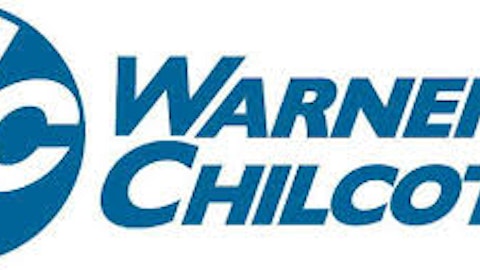Pharmaceutical giant Pfizer Inc. (NYSE:PFE) lost the patent production for its lucrative drug Lipitor back in 2011. The cholesterol medication became the top-selling drug in history, with over $125 billion in sales over 14 years. Lipitor sales reached $8 billion in annual revenue in the U.S. and $11 billion worldwide before losing its protected status on November 30, 2011.
In a matter of weeks, generic competitors Ranbaxy Laboratories and Watson Pharmaceuticals captured a majority 64% of the market share, with Lipitor’s share falling from 100% to a minor 36% share.
Nonetheless, Pfizer Inc. (NYSE:PFE) shares have risen more than 50% between the date of Lipitor’s patent loss and present time, a period of less than two years. Investors have renewed confidence as Pfizer unlocked value by selling its infant nutrition business to Nestle SA (VTX:NESN) for $11.9 billion and by spinning off animal health business Zoetis Inc (NYSE:ZTS).
Pfizer Inc. (NYSE:PFE) is now faced with patent loss for the “little blue pill,” or Viagra, which reached $2.05 billion in sales for 2012, a 4% increase over the prior year. Fortunately for shareholders, the patent loss is only for European markets. The United States will not honor a generic equivalent until 2020.
A second instance of patent expiration can be demonstrated with Merck & Co., Inc. (NYSE:MRK), which lost protection for Singulair in mid-2012. Sales of the asthma medication reached $1.5 billion for Q4 2011, before plummeting 67% to $480 million during Q4 2012.
However, Merck & Co., Inc. (NYSE:MRK) is poised to rebound with new product launches. The company recently introduced Januvia for diabetes and Isentress for HIV; Januvia is expected to produce $750 million in sales annually through 2020, providing a replacement for Singular.
Merck also acquired Schering-Plough in 2009, the same year that Pfizer acquired Wyeth. Schering-Plough was best-known as the maker of allergy drug Claritin.
Merck & Co., Inc. (NYSE:MRK)’s earnings are expected to grow at a healthy 8% annually over the next decade, compared to Pfizer’s forecast of low-single digit earnings growth. Among the two, I prefer Merck for its higher growth rate, current products, and healthier pipeline.
Foolish takeaway
Even if Allergan loses two-thirds of Restasis sales by 2016, the drug is not the be-all and end-all for a company with numerous growth drivers, including a pipeline within a product under Botox and late-stage drugs such as Darpin and a phase III treatment for nocturia. Juvederm and Latisse are also likely to receive an expanded label in the U.S. and E.U.
Now appears the right time to be a contrarian investor. The hand of cards dealt to Allergan shareholders isn’t as bad as the market believes, and I suggest that readers take advantage of the recent sell-off.
Thanks for reading, and consider subscribing to my posts for more Fool ideas on outperforming the market.
The article For Allergan Shareholders, Will it Be Dry Eyes or Tears of Joy? originally appeared on Fool.com is written by John Macris.
John Macris has no position in any stocks mentioned. The Motley Fool has no position in any of the stocks mentioned. John is a member of The Motley Fool Blog Network — entries represent the personal opinion of the blogger and are not formally edited.
Copyright © 1995 – 2013 The Motley Fool, LLC. All rights reserved. The Motley Fool has a disclosure policy.




